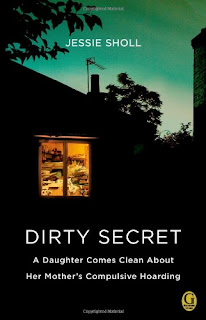4.26.2011
A Review: Dirty Secret: A Daughter Comes Clean About Her Mother's Compulsive Hoarding by Jessie Sholl
I don't know what exactly prompted me to purchase this book from the book depository recently, but it sounded interesting enough and wasn't going to burn a hole in my purse. Before you ask-- No, I've never seen the popular TV show that's seemed to capitalize on the illness, so it was more about the psychological element of the condition that made me want to pick it up.
The memoir is a quick and easy read. Sholl dedicates a small portion of the title to explain her family's background, and also, that of her mother's. She detours only shortly to express her own anxieties and the resentment she holds for her mother and the disdain she's felt throughout her life. Traveling from Sholl's home in NYC, the reader is present to witness several attempts to help her mother, the trips to visit her father and the ways it effects her relationship with her husband.
The memoir seemed to served as a vehicle in which the author could finally recognize her mother's illness without trying to control the situation. Throughout the title, Sholl is frequently rehashing ways to keep her mother's home clean "for good," while simultaneously feeling shameful and overwhelmed with the task of curing her mother of her hoarding. Sholl expresses bouts of depression and anxiety after leaving her mother on visits, in addition to the routine stresses of her life as a writer, and wife. Note: Sholl and her husband are infected with scabies after one of the visits, leading to a detailed account of the ways in which they unsuccessfully try to cure themselves for an entire year.
While I did appreciate the facts that Sholl included to elucidate facets of the condition, and the research that pointed to factors that often produce hoarders, I learned little about the condition, itself. I feel that the novel was a way for Sholl to express the severity of the issue, stating that,"six million Americans" suffer from the condition, in order to offer some assurance to those who also have close relationships with individuals who are hoarders. All and all, it was informative and eye-opening. I felt that readers could identify with Sholl's attention to the human desire to be liked and understood. I would recommend this if you feel like reading something outside of your comfort zone, or to read about a condition that you might not have been aware of beforehand.
Labels:
books,
Dirty Secret,
Jessie Sholl,
Memoir
Subscribe to:
Post Comments (Atom)


I'm definitely aware - I'm a frequent viewer of the A&E TV show, to keep myself in line - but this looks like a great in-depth story that goes beyond the hour a tv show can give you. It is disappointing, though, that there's not more information about the condition. Thanks for the review!
ReplyDeleteI caught about 10 minutes of the show "Hoarders" once and it really freaked me out. I just don't get it. If this book doesn't explain much about the condition itself, I don't think I'm too interested.
ReplyDeleteI'm very fascinated by people who hoard useless items and just plain junk. Maybe it's because I've moved every year for the past 8 years, so I've had the opportunity to go through and trash unused things often. I'm sorry that the book didn't delve more into the psyche of someone with the condition. I'm really interested in the motivation ...why does someone, from their pov, feel this compulsive need to amass so much. I guess a lot of the problems could stem from the mass culture of consumerism we currently live in.
ReplyDeleteBrenna, It's not completely devoid of psychological explanation of the condition. It certainly talks about the types of backgrounds that hoarders typically come from like abusize households or those that are completely neglected all together. Furthermore, she also lists the character traits that many hoarders possess. I would say that you'll certainly learn something about the condition. It's more readable as opposed to a dense academic type title.
ReplyDeleteJenna- There were theories that hoarders were typically those who suffered during the depression; however, they've recently debunked this theory because it doesn't explain the junk that piles up. It definitely did cover some psychological explanations for hoarding, but, in my opinion, could have included a little more research.
Beth, Well that doesn't sound so bad. I suppose if I were going to learn something about the condition I'd rather not read anything too dense.
ReplyDelete